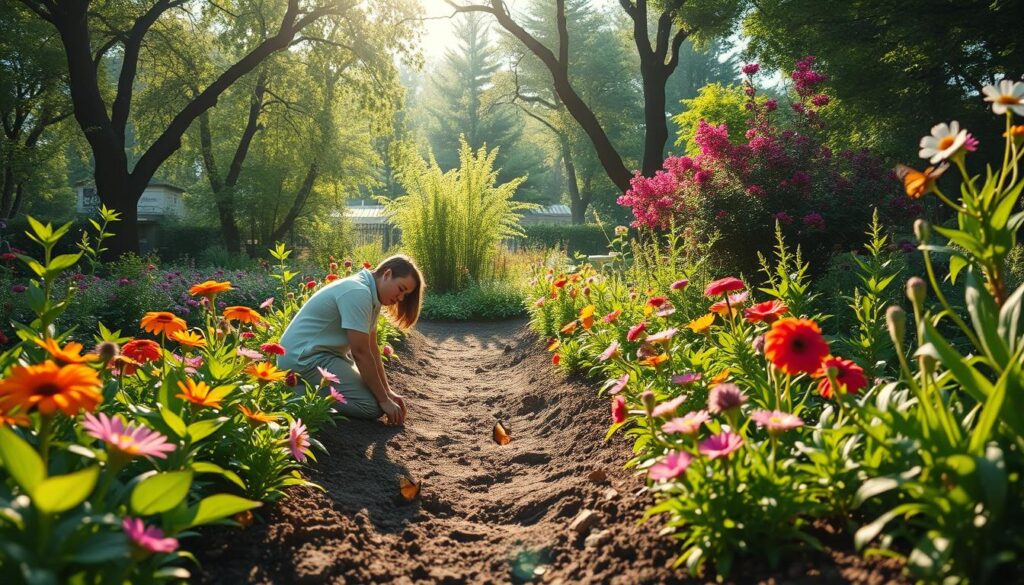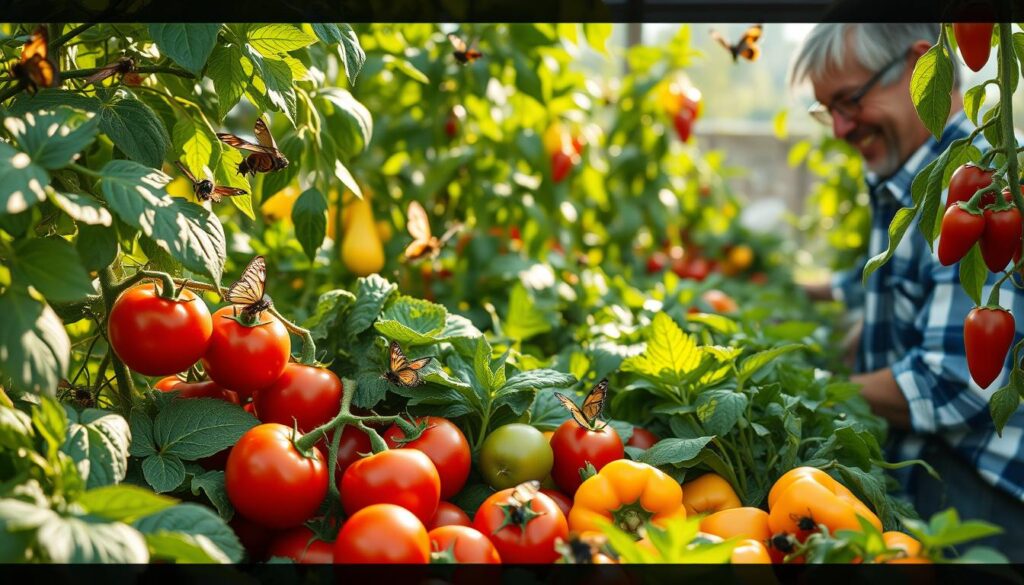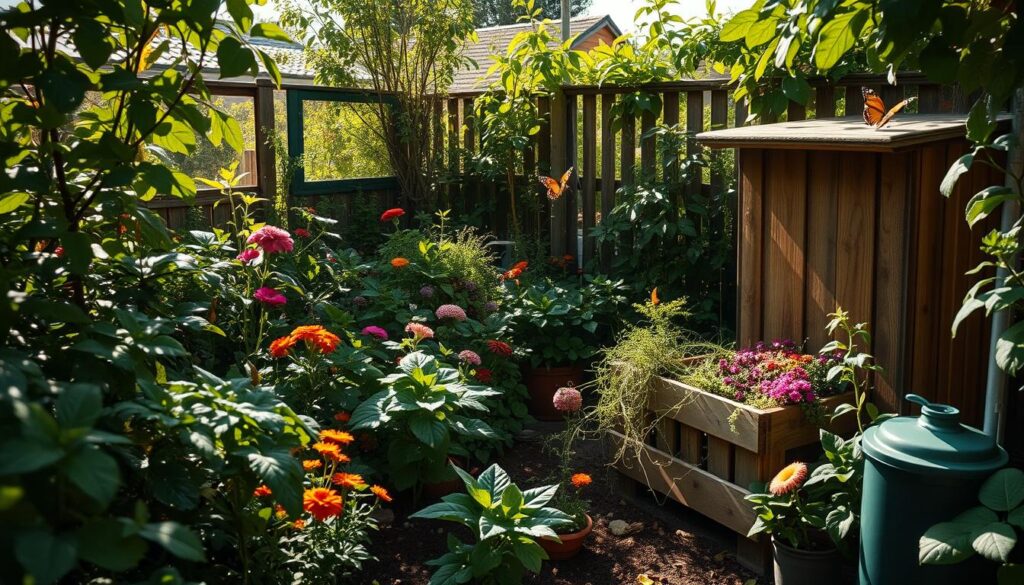The Health Advantages of Gardening You Need to Know
Feeling stressed, out of shape, or disconnected from nature? Gardening can change your health, mood, and life outlook. It’s more than just making your yard look good.
Gardening helps your health by getting you moving. It can keep your weight and blood pressure in check. The CDC says gardening is exercise, from easy tasks like raking to hard work like shoveling.
It works many muscles, burns calories, and helps with weight and heart health.
Gardening also boosts your mental health. Being around plants lowers stress hormones. Studies show gardening can cut stress hormones by up to 30%.
It makes you feel relaxed and can help with anxiety and depression. People who garden often feel happier and more satisfied with life.
Gardening is a great way to stay active and connect with nature. Being outside and gardening can make you feel better. Research shows gardening can make you feel 70% more relaxed.
It also helps you sleep better and eat healthier. Growing your own food means you get to enjoy fresh, healthy meals.
Gardening offers many health benefits. It improves your fitness, mental health, and quality of life. So, why not start gardening today and enjoy these benefits?
Physical Benefits of Gardening as Exercise
Gardening is more than a hobby; it’s a great way to stay fit and healthy. It’s recognized by health experts, like the CDC, as a form of exercise. Gardening can greatly improve your overall health.
Cardiovascular Health
Gardening activities like raking and weeding can meet your daily exercise needs. These activities help keep your heart healthy and control blood pressure. Gardening increases your heart rate, improving blood flow and heart health.
A Japanese study showed that looking at plants can lower blood pressure and muscle tension. These are key signs of good heart health.
Weight Management
Gardening is a natural way to manage your weight. Light gardening can burn about 330 calories per hour. This is more than walking at a moderate pace for the same time.
A 2013 study found that people who gardened had lower BMIs than their neighbors. Gardening for 30 minutes a day can help prevent high blood pressure and aid in weight control.
Strength and Flexibility
Gardening also strengthens muscles and improves flexibility. Activities like digging and lifting work different muscle groups. These movements build strength, improve flexibility, and endurance.
Being in sunlight while gardening can also lower blood pressure and boost vitamin D. This adds to your overall physical health.
Gardening is a full-body workout that benefits both your body and mind. It offers a holistic approach to health and fitness.
How Gardening Improves Mental Health
Gardening is becoming more popular in the U.S., with about 1 in 3 people doing it. It offers many mental health benefits, like stress relief and better overall well-being. Gardening can also boost confidence, show progress in plant care, and make you more emotionally resilient.

Reduction in Anxiety and Depression
Gardening is great for reducing anxiety and depression. Studies in the Journal of Environmental Horticulture found it lowers depression rates. Caring for plants and being outside releases dopamine, which improves mood and memory.
Green spaces also bring calm, making life feel more peaceful. This leads to a more positive view of life.
Boosting Mood and Well-Being
Gardening also lifts your mood and overall well-being. Gardeners feel more satisfied with life than those who don’t garden. Being part of community gardens and clubs makes you feel connected, boosting self-confidence and self-worth.
Gardening releases dopamine, making you happier. It can lead to longer, happier lives. Research shows gardeners’ mood improves by 55%.
| Activity | Mental Health Benefit |
|---|---|
| Gardening | 36% reduction in stress and anxiety |
| Community Gardening | 47% increase in social connections |
| Daily Gardening | Higher life satisfaction |
The Therapeutic Benefits of Gardening
Engaging in therapeutic gardening offers many benefits. It’s a practice with roots over 2,000 years old. It’s a powerful tool for improving well-being.
A study found that those in horticultural therapy see a 65% drop in anxiety. Gardening also boosts sleep quality by 30% for cancer patients.

About 80% of gardeners feel a great sense of accomplishment. This feeling boosts emotional satisfaction and confidence, especially for those recovering. Gardening improves balance, blood flow, and prevents muscle loss.
Community gardens increase social interactions by 25%. They help build social bonds and a sense of belonging. Spending time in these gardens reduces feelings of isolation by 40%.
Horticultural therapy is great for those undergoing chemotherapy. 70% of patients report better emotional well-being after gardening. Just one hour a week can greatly improve mental health.
Data from Texas A&M AgriLife shows gardening helps with PTSD and dementia. It also reduces depression and boosts happiness. Gardening lowers stress hormones and improves outlook on life.
The Health Benefits of Growing Your Own Food
Growing your own garden is more than just getting fresh produce. It brings many health benefits. It’s not just about the joy of picking your own food. It’s also about living a healthier life.
Improved Nutrition
One big plus of growing your own food is getting fresh, nutrient-rich produce. Fresh fruits and veggies have the most vitamins and minerals. This supports a healthy diet.
Research shows that fresh produce loses nutrients quickly. So, homegrown food is always the best choice.
A single tomato plant can give you up to 30 pounds of tomatoes. This means more chances to eat healthy. For example, a pint of cherry tomatoes costs about $5.00. This shows the food is both nutritious and affordable.

Healthy Eating Habits
Growing your own food helps you eat healthier. Studies show people who garden eat more fruits and veggies. This matches the Dietary Guidelines for a balanced diet.
Also, gardening gets kids to like veggies more. It teaches them to eat healthy and feel responsible for their food choices.
By growing different foods like purple cauliflower and golden beets, you get more nutrients. These foods have antioxidants and Vitamin A. They make your meals taste better and keep you healthy.
| Fruits and Vegetables | Health Benefits | Average Yield |
|---|---|---|
| Tomatoes | High in Vitamins A and C | 30 pounds per plant |
| Beets | Rich in Vitamin A and antioxidants | 20-25 pounds per 10 feet row |
| Cauliflower (Purple) | Contains cancer-fighting compounds | 5-6 heads per year |
Environmental Benefits of Home Gardening
The environmental benefits of home gardening are huge. They help reduce our environmental footprint. For example, food production is a big source of carbon emissions, with 25% coming from industrial farming, says the US Environmental Protection Agency. Gardening at home cuts down on these emissions because it doesn’t need long transport routes.

Commercial farming uses a lot of pesticides and fertilizers. In the US, these chemicals cost over $15 billion and $19 billion each year. But, home gardening lets you choose organic options. This keeps the soil healthy and helps grow food that’s good for you.
More and more people live in cities, with 54% of the world’s population in urban areas. This number is expected to rise to 59% by 2030. Home gardens in cities are very important. They can be bigger than commercial farms and natural areas, keeping cities green.
Home gardens also help wildlife. They provide homes for many animals, even in cities. This helps keep ecosystems balanced and makes cities more resilient.
Home gardens do more than just grow food. They help local food markets, support food security, and bring people together. They also help communities during tough times by making them more resilient.
In short, environmental benefits of home gardening are many. They offer a green solution to today’s problems. By gardening, you’re not just growing plants. You’re also helping the planet and fighting climate change.
Gardening Benefits for Seniors and Retirees
Gardening is more than a hobby for seniors and retirees. It brings health and emotional benefits that make life fulfilling and active.
Social Interaction
Gardening helps seniors connect with others. Joining community gardens or clubs can reduce loneliness. It lets them share interests and feel better emotionally.
Physical Activity and Cognitive Stimulation
Gardening is great exercise. It involves bending, lifting, and reaching, which keeps seniors mobile and helps with weight management. It also boosts Vitamin D levels, preventing osteoporosis and other health issues.
Gardening also sharpens the mind. Planning garden layouts and solving problems keeps the brain active. This helps fight cognitive decline that comes with age.
Using ergonomic tools and raised beds makes gardening easier for those with physical challenges. It still offers mental benefits as they plan and adapt their gardens. Gardening also improves coordination and balance, lowering the risk of falls.
In summary, gardening benefits for seniors and retirees include better physical health, sharper minds, and more social connections. It’s a great activity for this age group.
How to Use Gardening as a Mindfulness Practice
Gardening can be very therapeutic, offering a chance to practice mindfulness. It helps you stay in the moment and connect with nature. This can greatly improve your mental health.
Mind-Body Connection
Gardening strengthens the mind-body connection, making it a great mindfulness activity. Activities like planting and watering keep you focused on the present. This focus helps you relax and think more clearly.
Mindfulness meditation can help with chronic pain. It also boosts vitality and reduces disease symptoms in people with rheumatoid arthritis. Gardening offers similar benefits by making you feel connected to nature.
Stress Relief Through Gardening
Gardening is a natural way to reduce stress. Tasks like raking can calm your mind and body. Studies show that gardening can lower stress by 30% and improve mood by 23%.
Touching soil or smelling flowers can improve memory and cognitive function by 15%. Gardening also increases joy and satisfaction by 45%. It can even reduce anxiety and depression by 40%.
Gardening for 30 minutes a day can make you less reactive to stress. It promotes mental health and a balanced life. By making gardening a mindfulness routine, you can find peace and emotional stability.
A survey found that 80% of gardeners feel more relaxed and connected when gardening. For many, it’s like active meditation, improving mental health by 62%.
By using gardening as a mindfulness practice, you can improve your mental health. This connection to nature brings more than just relaxation. It adds purpose and serenity to your life.
| Benefits | Mindfulness Practice |
|---|---|
| Mind-Body Connection | Engaging in present-moment activities like planting and watering. |
| Stress Relief | Performing repetitive tasks such as raking and weeding to calm the mind. |
| Cognitive Function | Sensory engagement, such as touching soil or smelling flowers. |
| Mental Health Improvement | Experiencing a decrease in anxiety, depression, and stress levels. |
Gardening for Overall Well-Being
Gardening is more than just a hobby; it’s a way to stay fit, clear your mind, and feel good. During the COVID-19 pandemic in 2020, more people started gardening. This shows how gardening for overall well-being can improve health.
Gardening is like a workout, burning up to 400 calories an hour. It meets the CDC’s weekly exercise goal. It also helps fight age-related weight gain, studies show.
Gardening is good for your mind too. Being part of a community garden can boost mental health. It also helps reduce stress and anxiety by making you feel happy.
Gardening also sharpens your mind. A Korean study found that gardening can help dementia patients. It can even cut dementia risk by half, showing its power for brain health.
Growing your own food is a big plus of gardening. Foods like tomatoes and spinach are full of nutrients. They make your diet healthier and more nutritious.
- Physical fitness through calorie-burning activities
- Mental clarity with reduced stress and anxiety
- Emotional well-being through serotonin production
- Improved cognitive health by reducing the risk of dementia
- Enhanced nutrition from homegrown, pesticide-free produce
Gardening touches many areas of health, leading to better overall well-being. It encourages a balanced life and brings a sense of pride and happiness.
Conclusion
Gardening is a treasure trove of health benefits for everyone. It helps reduce anxiety and depression, and boosts mood and well-being. Studies show gardening can lower depression and anxiety, and improve life satisfaction.
Gardening is also a form of exercise that helps manage weight and improves heart health. Activities like digging and watering not only keep you fit but also sharpen your mind. It’s especially good for older adults, helping with memory care in Alzheimer’s disease.
Gardening also brings people together, especially for seniors. Community gardens like those at Lutheran Hillside Village and Laclede Groves create social bonds. These bonds are key for emotional, intellectual, and physical health. A meta-analysis shows gardening is a powerful tool for public health.
In short, gardening is a game-changer for health and well-being. It tackles physical, mental, and social health, making it a preventive and therapeutic activity. Gardening can improve your fitness, mood, and sense of community. Start gardening today and enjoy its many health benefits!
FAQ
How does gardening improve mental health?
What are the physical benefits of gardening?
How can gardening serve as a therapeutic practice?
What are the health benefits of growing your own food?
How does home gardening benefit the environment?
Why is gardening beneficial for seniors and retirees?
How can gardening be used as a mindfulness practice?
What are the overall health benefits of gardening?
Why is gardening a great hobby for families?
Are there surprising cognitive benefits to gardening?
- 10 Must-Have Blooms for Your 2025 Garden
- The Health Advantages of Gardening You Need to Know
- How to Create a Small Vegetable Garden Layout Plan: A Beginner’s Guide
- DIY Garden Projects for Small Spaces: Upcycling Ideas to Maximize Your Garden
- Watering Techniques for Small Gardens: Ensuring Your Plants Thrive
- Small Border Plants for Landscaping: Adding Beauty and Functionality to Your Garden
- Year-Round Small Space Gardening: Seasonal Planting Tips for Maximum Harvest
- Essential Tools for Small-Space Gardening: What You Really Need
- The Ultimate Guide to Container Vegetables: What to Grow in Small Spaces
- Budget-Friendly Gardening: How to Create a Thriving Garden on a Tight Budget
- How to Optimize Sunlight in Small Gardens: Tips for Better Plant Growth
- DIY Vertical Planters: Creative Ideas for Small Space Gardening
- Companion Planting for Small Vegetable Gardens: Boost Growth and Deter Pests
- Container Gardening Essentials: Choosing the Right Pots, Soil, and Plants
- Vertical Gardening Techniques: Maximizing Your Small Space with Climbers and Vines
- How to Build a Raised Bed Garden in a Small Backyard: Step-by-Step Guide
- The Best Vegetables for Small-Space Gardens: High-Yield Varieties You Need to Grow
- Smart Vegetable Garden Layouts for Small Spaces: Maximizing Your Green Thumb in Compact Areas
- 40. Best Practices for Managing a Sustainable Garden Year-Round
- Building a Wildlife Pond for Biodiversity
- Advanced Techniques in Sustainable Gardening
- How to Create a No-Till Garden
- The Mental Health Benefits of Gardening
- Using Technology to Enhance Sustainable Gardening
- Getting Certified Organic: Steps and Benefits

Leave a Reply